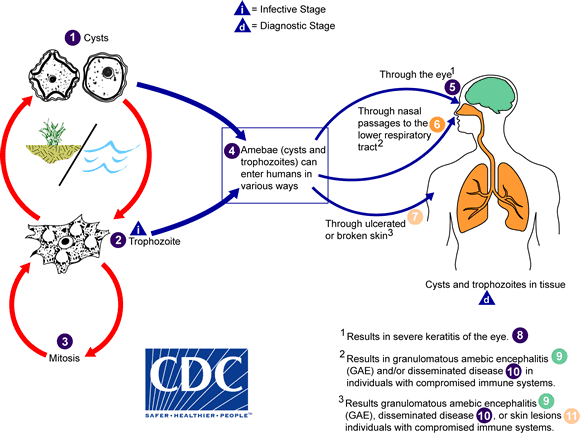Pathogen & Environment
Causal Agents:
Acanthamoeba spp. , are commonly found in lakes, swimming pools, tap water, and heating and air conditioning units. Several species of Acanthamoeba, including A. culbertsoni, A. polyphaga, A. castellanii, A. astronyxis, A. hatchetti, A. rhysodes, A. divionensis, A. lugdunensis, and A. lenticulata are implicated in human disease.
Life Cycle:

Acanthamoeba spp. have been found in soil; fresh, brackish, and sea water; sewage; swimming pools; contact lens equipment; medicinal pools; dental treatment units; dialysis machines; heating, ventilating, and air conditioning systems; mammalian cell cultures; vegetables; human nostrils and throats; and human and animal brain, skin, and lung tissues. Unlike N. fowleri, Acanthamoeba has only two stages, cysts ![]() and trophozoites
and trophozoites ![]() , in its life cycle. No flagellated stage exists as part of the life cycle. The trophozoites replicate by mitosis (nuclear membrane does not remain intact)
, in its life cycle. No flagellated stage exists as part of the life cycle. The trophozoites replicate by mitosis (nuclear membrane does not remain intact) ![]() . The trophozoites are the infective forms, although both cysts and trophozoites gain entry into the body
. The trophozoites are the infective forms, although both cysts and trophozoites gain entry into the body ![]() through various means. Entry can occur through the eye
through various means. Entry can occur through the eye ![]() , the nasal passages to the lower respiratory tract
, the nasal passages to the lower respiratory tract ![]() , or ulcerated or broken skin
, or ulcerated or broken skin ![]() . When Acanthamoeba spp. enters the eye it can cause severe keratitis in otherwise healthy individuals, particularly contact lens users
. When Acanthamoeba spp. enters the eye it can cause severe keratitis in otherwise healthy individuals, particularly contact lens users ![]() . When it enters the respiratory system or through the skin, it can invade the central nervous system by hematogenous dissemination causing granulomatous amebic encephalitis (GAE)
. When it enters the respiratory system or through the skin, it can invade the central nervous system by hematogenous dissemination causing granulomatous amebic encephalitis (GAE) ![]() or disseminated disease
or disseminated disease ![]() , or skin lesions
, or skin lesions ![]() in individuals with compromised immune systems. Acanthamoeba spp. cysts and trophozoites are found in tissue.
in individuals with compromised immune systems. Acanthamoeba spp. cysts and trophozoites are found in tissue.
Life cycle image and information courtesy of DPDx.
- Page last reviewed: June 5, 2017
- Page last updated: June 5, 2017
- Content source:


 ShareCompartir
ShareCompartir